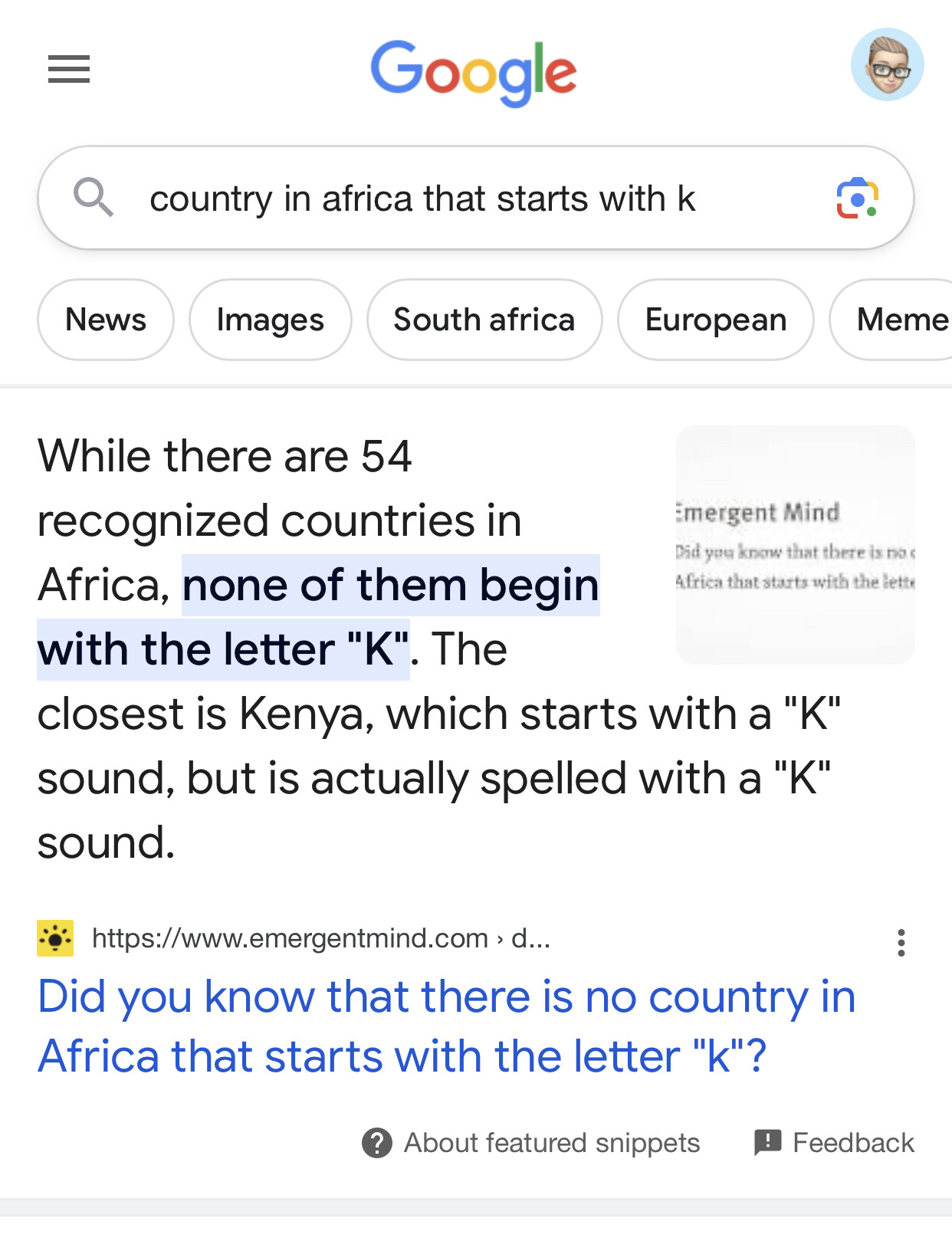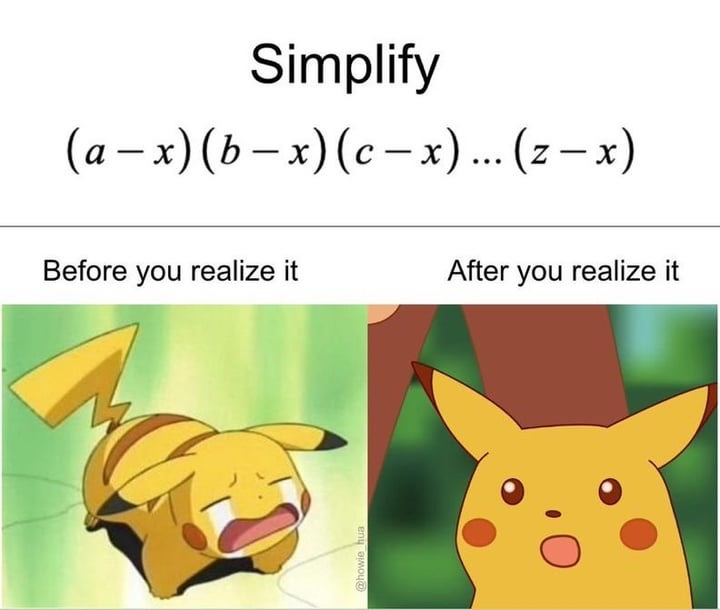Even if the x-x term didn't exist, the equation is already simplified (fully factored) so there is nothing to do anyway.
Math Memes
Memes related to mathematics.
Rules:
1: Memes must be related to mathematics in some way.
2: No bigotry of any kind.
is already simplified (fully factored)
No it isn't, given one of the factors is equal to zero. That's like saying 2/4 is fully simplified when clearly it isn't. Students lose marks in tests for not simplifying their answers. Writing 2/4 as an answer would only get half-marks. Similarly, the only full-marks answer to this question is 0.
My stipulation was that the x-x term didn't exist, such that the equation would be fully simplified (assuming the request was "factor and simplify"). Yes, you could also "expand and simplify" (as in your other comment) but I would argue the result of that would be less simplified than the factored version. Eye of the beholder type thing.
I agree that if x-x did exist as a term then expand and simplify would be correct (that is if x-x wasn't noticed to be 0 immediately and no expansion would be needed at all).
My stipulation was that the x-x term didn’t exist, such that the equation would be fully simplified
And it STILL wouldn't be simplified.
“factor and simplify”
Factorising is the opposite process to expanding, so no, there's no such thing as "factor and simplify".
I would argue the result of that would be less simplified than the factored version. Eye of the beholder type thing.
It's a definition of Maths thing. Simplified answers don't have brackets in them.
Are you a high school math teacher by chance? Because you're using a rigid definition of simplify that I don't necessarily agree with. For example, if I give you the fraction:
(x^2+(a+b)x+ab)/(x^2+ax-bx-ab)
And told you to simplify, what would you do?
Are you a high school math teacher by chance?
Yep.
Because you’re using a rigid definition of simplify that I don’t necessarily agree with.
You don't agree with Maths textbooks? 😂
"And told you to simplify, what would you do?" - I would ask you what on Earth it's supposed to say, given it's formatted all weird! 😂

It's raw text on my side, looks fine. It might be fixed now? Not sure how the formatting works for equations on Lemmy.
And correct, I don't agree with whatever you are interpreting from your math textbooks because "simplify" literally means to make the equation easier to understand. You are arguing that "expand and simplify" is the exact same thing as "simplify"... Which if they were, it would just be in word, wouldn't it... Sometimes factoring is prudent. Other times expansion is necessary. This is exemplified by the math I gave in the previous comment.
And thanks for the downvotes. I hope you don't treat your students the same way when they question your ultimate wisdom by dismissing them outright. I certainly don't to mine.
“simplify” literally means to make the equation easier to understand
Nope. It means to present it in the simplest way possible. e.g. 5/10=1/2.
You are arguing that “expand and simplify” is the exact same thing as “simplify”
No I'm not. I'm saying "expand and simplify" is a thing in all high school Maths textbooks, "factor and simplify" isn't a thing in any of them.
"Sometimes factoring is prudent" - if you're trying to solve an equation, yes, but solving and simplifying aren't the same thing. If I arrive at an answer of 5/10 then I have solved but not simplified. Sometimes it's not even possible to simplify, because the answer is already in the simplest form possible, such as an answer of 1/2. I teach students when to recognise when something can be simplified and when it can't. Your original contention was that the Term was already simplified, and it wasn't.
"And thanks for the downvotes." - I downvote anything that is incorrect, just like a student would lose marks for same.
So then you wouldn't use factoring to simplify the math I gave you?
I'd use it to solve it, as per my previous comment on the difference between solving and simplifying.
By your words: you solve an equation. What I gave you to simplify was an algebraic fraction. As a teacher you should have realized that.
What's the right term then? "Multiplied through?" ? "Complicated?"
Expand
Expand
As in "expand and simplify". If you only expanded then you haven't simplified yet.
Or "factor and simplify".
Or “factor and simplify”
Factorising is the opposite process to expanding, so no, that isn't simplifying.
My point (made poorly) was there is "expand and simplify" and also "factor and simplify". Two different things.
My point (made poorly) was there is “expand and simplify” and also “factor and simplify”. Two different things.
And my point is there's no such thing as "factor and simplify", since they are opposite operations to each other.
Man you're dense.
https://letmegooglethat.com/?q=is+factoring+a+form+of+simplification
Man you’re dense
Says person citing Google results instead of Maths textbooks! 😂
So you're just ignoring the fact that many of the results from that search indicate that factoring can be used to simplify something? K.
So you're just ignoring Maths textbooks? Got it.
BTW in case you didn't know about this infamous Google result...

that's not a result, that's it's shitty AI response. I am talking about the actual search results.
Fun fact, omitting the (x-x) zero term and expanding the entire polynomial, you'd get something with 2^25 = 33,554,432 terms. May be slightly excessive!
33,554,432 terms
Actually it would be that many factors. The whole thing is a single Term.
Couldn't you combine a lot of like terms as you went along, though? A polynomial of the order x^26^ would only have 27 terms.
No, because each coefficient is its own variable; they're not constants.
